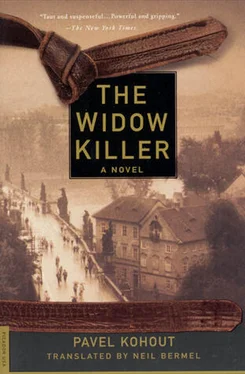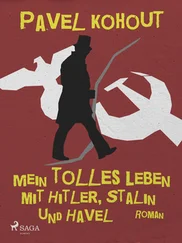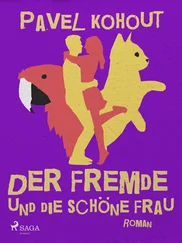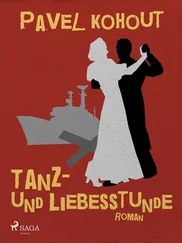What was his own part in his nation’s guilt? Could the two be separated? And more importantly: Could Germany’s guilt be redeemed? He kept trying to do just that, even though the Third Reich could still avoid total defeat, leaving ius germanicum the law of the victors. The newly announced German doctrine seemed to count on this possibility, at least in Kroloff s version. It took his breath away.
According to absolutely reliable sources, British prime minister Churchill and the new American president Truman were convinced that Stalin intended to establish Communist regimes in all the territories occupied by the Red Army, thus building a bridgehead that would let him quickly conquer the rest of Europe. The new German leadership planned to distance itself from the excesses of some SS units, which it would apparently disband, the skull head explained enthusiastically — as if the Gestapo would go scot-free! They would then offer the Anglo-Americans a partial capitulation and an assurance that Germany would carry on the battle against the Bolsheviks.
Field Marshall Schörner had assumed the high command over German staff, central offices, and services in the area controlled by Mitte’s armies, who would play a leading role in these plans. Certain persons had let the situation in Prague get temporarily out of hand; they would be punished and replaced. Lieutenant General Meckerle was sending his best men to provide political reinforcement in threatened areas. He, Kroloff, felt honored to be accompanying the chief inspector to Pankrác, a crucial neighborhood in the southeast of the city. There they would secure the beginning of the route that would let more than fifty thousand troops and their equipment leave Prague every day for the west.
Impossible, Buback marveled; they were sending him to Grete! Given the circumstances, he quickly reconciled himself to the change in plans. Anyway, he soon found out Meckerle was momentarily absent, and Buback could learn far more in the field than the gossip and fairy tales he’d heard here.
“How will we get there?” he probed. “As far as I can tell, we only hold the city center.”
“Armored transports will come for the authorized representatives,” Kroloff announced. “The Czechs only have light weapons.”
Among which is a Panzerfaust, Buback nearly said aloud. He would have to rely on Grete’s cross.
They waited almost three hours for the escort vehicles. The column commander seemed on the verge of shooting himself as he described how they had wandered around and around in some suburb, because the Czechs had repositioned all the road signage, even swapping the street signs around; the Nazis’ perfect maps were useless. Finally a German woman, a native of Prague, had saved them when she saw the convoy for the third time and had the courage to run out of her house, climb up to the cabin of his vehicle and guide them here.
On the way to Pankrác, Buback saw that what had been primitive barriers at noon were being continually, diligently, and painstakingly strengthened. However, the flotsam and jetsam from workshops, construction sites, and houses were no match for caterpillar vehicles. All along the route the Czechs fled into nearby buildings; the convoy met no opposition.
In crossing the deep gash called the Nusle Valley, Buback was reminded of how the city’s topography would aid in its defense. Still, he knew the force that was preparing to strike, and could imagine the desolation it would leave in its wake. As they rose toward Pankrác, a rare panorama opened for a moment before them: to the left the towers of Vy  ehrad, to the right the cupolas of Karlov, and beyond the river the distant Hrad
ehrad, to the right the cupolas of Karlov, and beyond the river the distant Hrad  any Castle, which seemed to hang in the air.
any Castle, which seemed to hang in the air.
How odd: Although he had lived most of his life in Dresden, and its destruction had filled him with deep sadness, he accepted it as a higher form of justice, one gruesomely foreshadowed in the deaths of Hilde and Heidi. Now he felt sure: This war Germany had begun was immoral. It had bathed Europe in tears and blood, and his nation would be punished for it with the cruelest defeat in history — tragic, yet logical! Prague had been brutally violated six years ago; was it really possible she would be reduced to ruins now, when freedom and renewed dignity were just around the corner?
How strange it was! He had spent his early childhood in Prague, and had only a couple of fleeting, not to mention banal, memories of his life here; how could he feel more connected to this place than to the city where he had studied, worked, and loved, a city he had known far better? But he knew the answer: Something in the unconscious of the young child Erwin Buback had stirred his mind and heart and tied him inexplicably to this place. For years that “something” had been submerged beneath a flood of other sensations, but it did not disappear. It was still there, as strong as ever, and awoke again as soon as he returned: the language of his birth mother, forever his native tongue.
This did not quite make him a Czech, but he could not call himself a pure German either. So he was simply a native of Prague, heir to two and more cultures which for centuries had lived side by side, separate but not hostile. He must have had more of Prague in him than he realized, since both his Czech and German sides hoped with equal fervor that the splendid scene before him would be preserved for future generations.
So then, he was not a traitor, absolutely not. He was a redeemer of betrayal, destined by his heritage to help bring this destruction and murder to an end, so that Czechs and Germans in his native city could someday meet on the same sidewalk and greet each other with a tip of the hat…
Only the Praguers gave Brunát’s reinforcements trouble on the way over. Encouraged by the radio defenders’ example, they suddenly filled Wenceslas Square; the Germans lost interest in shooting, and seemed glad of the chance to withdraw to Bredovská Street with their skins intact. When the police finally got through, they reached the building by climbing across rooftops, and after a short battle drove the SS from the sixth to the fourth floor. The Germans attempted to break through past Morava to the main hall, but they did not succeed. The soldiers on the first floor were now hemmed in by Czech irregulars on the surrounding streets, and Director Thürmer was forced to open negotiations.
Thürmer was a shadow of the man who two hours earlier had shouted at them, pistol in hand; he clearly saw the situation (or, at the very least, his own personal case) as hopeless. He did not even mention retreating with weapons; instead he requested, or more accurately begged, for an escort to accompany the German employees and soldiers to the main train station, which was still occupied by the Wehrmacht. The commander of the SS forces in the hall agreed to the arrangement as well. Brunát took over command but did not release Morava.
“Once they leave the building, have it searched thoroughly, so they don’t leave a Trojan horse in here — they’ll certainly try to get the radio back by any means possible and we don’t want to be stabbed from behind. And Morava: Get some systems in place right from the start. I know our countrymen: Soon thousands of radio station warriors will be demanding a reward for their services. Round up all the paper pushers and have them record everyone who’s been here since twelve-thirty. And be sure to get a list of the dead; they’ll start looking for them shortly. Then off to Beran; he needs you.”
While two hours earlier everyone stuck at the radio had desperately wished to be as far as possible from that steel-and-concrete trap, now almost no one would leave the building. Despite the near-certainty that the Germans would be back, the Czechs were now eager and impatient; their long-awaited victory could come here, today.
Читать дальше

 ehrad, to the right the cupolas of Karlov, and beyond the river the distant Hrad
ehrad, to the right the cupolas of Karlov, and beyond the river the distant Hrad  any Castle, which seemed to hang in the air.
any Castle, which seemed to hang in the air.










